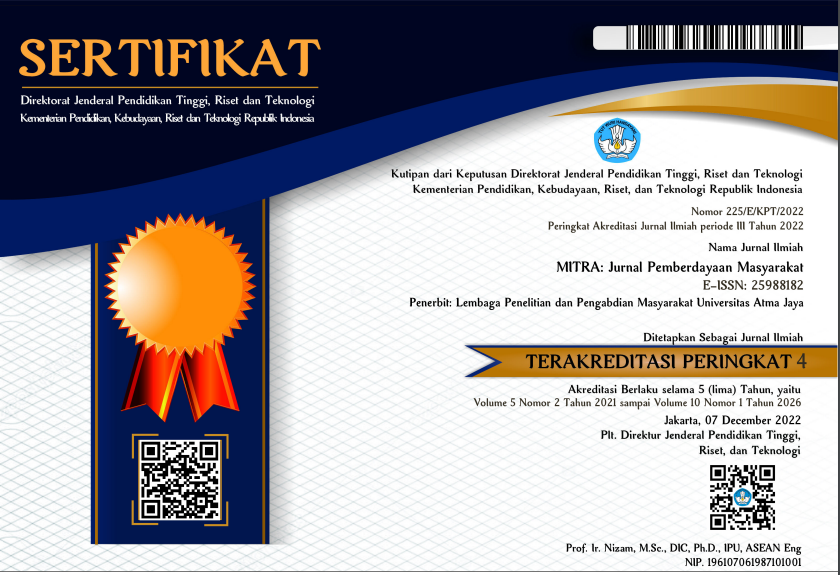BioTech Talk: Virtual Socialization on a Healthy Lifestyle to Prospective Students to Prepare for Face-to-Face Learning
DOI:
https://doi.org/10.25170/mitra.v7i1.3329Keywords:
BioTech Talk; Covid-19; Instagram; YouTubeAbstract
Prospective students were included in the 12 to 18 years old age category of people who are permitted to obtain Covid-19 vaccine starting on June 2021. Face-to-face learning has been implemented soon after most students received full dose of vaccination. The objective of this program was to provide social campaign activities to high school students, particularly those who have enrolled in the Faculty of Biotechnology, Atma Jaya Catholic University of Indonesia as new students in 2022, so that they could understand the importance of maintaining healthy lifestyle and following the recommended health protocols, obtain the right fact about Covid-19 vaccine, and act smart to reduce masks waste in order to prevent the transmission and infection of Covid-19 virus. The campaign “Biotech Talk” was performed virtually and in an asynchronous mode using an official social media account of the faculty, such as Instagram and YouTube. It was held for 6 weeks, starting on October 1st to November 16th, 2021, in the form of infographics and mini talk show videos. The same video content in Instagram received higher numbers of viewers and likes as compared to that in YouTube. Viewers were also encouraged to fill in the post-test and questionnaire of each episode as a method of evaluating the social engagement and interest of the video. The mean score of all episodes’ post-test was high (minimum 77 out of 100) and 60% of the respondents stated that the contents were clearly explained and relevant to the theme. Biotech Talk has been held in a timely manner and able to improve the viewer’s knowledge on healthy and smart lifestyle in the pandemic era as a preparation of face-to-face learning in the university.
References
Al-Eisa, E., Al-Rushud, A., Alghadir, A., Anwer, S., Al-Harbi, B., Al-Sughaier, N., Al-Yoseef, N., Al-Otaibi, R., & Al-Muhaysin, H. A. (2016). Effect of motivation by “Instagram” on adherence to physical activity among female college students. BioMed Research International, 2016(1546013), 1–6. https://doi.org/https://doi.org/10.1155/2016/1546013
Bramasta, D. B. (2021). Berlaku hari ini, berikut aturan lengkap PPKM darurat Jawa-Bali. Retrieved July 28, 2021, from https://www.kompas.com/tren/read/2021/07/03/060300065/berlaku-hari-ini-berikut-aturan-lengkap-ppkm-darurat-jawa-bali?page=all
Carpenter, J. P., Morrison, S. A., Craft, M., & Lee, M. (2020). How and why are educators using Instagram? Teaching and Teacher Education, 96(103149), 1–14. https://doi.org/https://doi.org/10.1016/j.tate.2020.103149
Darabi, A., Arrastia, M. C., Nelson, D. W., Cornille, T., & Liang, X. (2010). Cognitive presence in asynchronous online learning: A comparison of four discussion strategies. Journal of Computer Assisted Learning, 27(3), 1–12. https://doi.org/https://doi.org/10.1111/j.1365-2729.2010.00392.x
Juwita, E. P., Budimansyah, D., & Nurbayani, S. (2015). Peran media sosial terhadap gaya hidup siswa. Sosietas Jurnal Pendidikan Sosiologi, 5(1), 1–7. https://doi.org/https://doi.org/10.17509/sosietas.v5i1.1513
Lu, Z., Xia, H., Heo, S., & Wigdor, D. (2018). You watch, you give, and you engage: A study of live streaming practices in China. CHI ’18: Proceedings of the 2018 CHI Conference on Human Factors in Computing Systems, 1–13. https://doi.org/https://doi.org/10.1145/3173574.3174040
Madrim, S. (2021). Survey indicator: 41 persen masyarakat enggan divaksin. Retrieved July 28, 2021, from https://www.voaindonesia.com/a/survei-indikator-41-persen-masyarakat-enggan-divaksin/5786694.html
Rahayu, R. N., & Sensusiyati, S. (2020). Analisis berita hoax Covid-19 di media sosial di Indonesia. Intelektiva: Jurnal Ekonomi, Sosial & Humaniora, 1(9), 60–73.
Rahmatika, R., Yusuf, M., & Agung, L. (2021). The effectiveness of Youtube as an online learning media. Journal of Education Technology, 5(1), 152–158. https://doi.org/https://doi.org/10.23887/jet.v5i1.33628
WHO. (2021). COVID-19 weekly epidemiological update. Retrieved July 28, 2021, from https://www.who.int/docs/default-source/coronaviruse/situation-reports/20210202_weekly_epi_update_25.pdf
Downloads
Published
Issue
Section
License
Copyright (c) 2023 Widya Agustinah, Listya Utami Karmawan, Renna Eliana Warjoto, Daru Seto Bagus Anugrah Bagus, Daniel Imanuel Yaurentus, Christian Kenneth

This work is licensed under a Creative Commons Attribution-NonCommercial-ShareAlike 4.0 International License.
This license allows reusers to distribute, remix, adapt, and build upon the material in any medium or format for noncommercial purposes only, and only so long as attribution is given to the creator. If you remix, adapt, or build upon the material, you must license the modified material under identical terms.



_.jpeg)

.png)
2.png)
.png)
.png)



